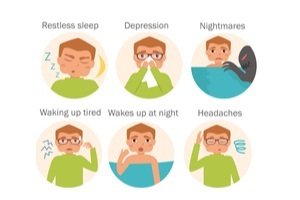What Are the Symptoms of Insomnia?
- Updated on: Jul 29, 2024
- 2 min Read
- Published on Apr 18, 2021

Do You Have Any of These Insomnia Symptoms?
Data from National Institutes of Health (NIH) indicate that a large number of people believe they suffer from insomnia. More than 40 million people say that they have symptoms of either chronic or acute or both types of insomnia. This is shocking! These people are not able to fall asleep or stay asleep in the night.
In addition to it, about 20 million people report that they’ve had temporary episodes of insomnia in the past.
Acute insomnia is short-term. It can last from one night to a few weeks. Chronic insomnia occurs when a person has insomnia at least three nights a week for more than a month. Read about Insomnia and its types here.
Most of us have experienced brief episodes of insomnia at least once or a few times. Almost everyone knows how it feels to be awake early in the morning or midnight. This can happen when you travel and experience jet lag, or when you’re troubled for some serious thing or overwhelmed by life situations.
So how do you distinguish a normal sleep problem that would go after the circumstances are over from a serious form of insomnia that requires proper diagnosis, treatment, and a care plan? It is important to know about the signs and symptoms of insomnia and how they influence your daily life.
Insomnia Signs and Symptoms
If you have insomnia, you might have several of these following signs and symptoms:
- Can’t go to sleep at night
- Lie awake for long periods at night
- Wake up several times during the night
- You can’t return to sleep if you’ve woken up once
- Wake up early in the morning
- Mood swings
- Sleepiness during the day
- Tiredness
- Irritability
- You lose concentration, attention
- Poor memory (cognitive impairment)
- Tossing and turning in bed
- Feelings of anxiety
- You forget everything easily
- Clumsiness
- You do not feel refreshed and energized when you get up
- Find it hard to nap during day
- Poor performance at school or work
- Impulsiveness and aggression
- Errors or accidents
- Sometimes, difficulty in personal relationships
Duration and Degree of Insomnia
The duration of insomnia is important when doctor prepare your treatment plan. They consider insomnia chronic if it occurs at least three nights each week for at least three months.
You may want to consider whether and how much is insomnia affecting your life. If you feel tired or have low energy during the day and it affects your performance, day to day activities including enjoyment with friends and families, you might need a treatment. You may, in the beginning, try to make adjustments to your sleep routines on your own and see if it works. Read about treating insomnia.
If you think you have insomnia, talk your physician. He will examine your symptoms and provide a diagnosis. Your doctor may interview your bed partner too about the quantity and quality of your sleep to derive some conclusion.? Read about diagnosing insomnia.
Insomnia is most often linked to other problems such as stress, depression, certain medical conditions or mental disorders, abuse of certain substances such as alcohol. Drinking of alcohol before bedtime can cause early or frequent waking up during the night. Insomnia can also occur if you suddenly stop taking sleeping pill. Read about causes of Insomnia.











